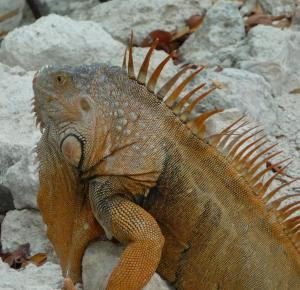Metabolic Bone Disease
- posted: Dec. 02, 2017
 Metabolic Bone Disease in Reptiles
Metabolic Bone Disease in Reptiles
In addition to our own bearded dragon, Sydney, Patton sees a number of reptiles including snakes, turtles and lizards. Reptiles can be difficult to care for, and one problem our doctors see is a complex and serious condition known as metabolic bone disease.
Metabolic bone disease (MBD) is most commonly seen in lizards, especially iguanas, and sometimes in turtles. It is more common in species who require ultraviolet light from the sun to produce vitamin D3. Reptiles who are not receiving proper levels of calcium and phosphorus in their diets and who do not receive adequate UV light are at highest risk. Sadly, this disease is usually a result of improper care, so, please do your research before purchasing or adopting a reptile to ensure that diet and housing needs of a particular species are met.
Symptoms of metabolic bone disease include limping, swollen limbs, inability to walk or climb, paralysis or dragging of the legs, muscle tremors, loss of appetite and weight loss and a soft jaw or rounded head. The condition is also sometimes known as “rubber jaw.” Basically, the bones become soft or demineralized and can cause issues with weakness, mobility and even cause fractures of the bones. Metabolic bone disease can be diagnosed by taking radiographs (x-rays) of the skeleton.
If evidence of MBD is found, steps must be taken to correct the diet and ensure the reptile has access to the UV light it needs and for adequate lengths of time. Natural sunlight is best (though direct exposure to sunlight can be harmful if the reptile is in a glass cage as he may overheat) but special UVB bulbs can also be used. A good diet must include balanced levels of protein, phosphorus and calcium. You may need to feed insects supplemented with calcium, use calcium supplements or feed dark green veggies low in oxalates such as endive, carrot tops or spring mix to herbivores.
Reptiles can recover from metabolic bone disease, though some may be permanently disabled or they may even die if severely affected. Remember to pay attention to diet and housing needs of reptiles to avoid this problem.
This blog brought to you by the Patton Veterinary Hospital serving Red Lion, York and the surrounding communities.
Source http://www.peteducation.com/article.cfm?c=17+1796&aid=3581
Location
Patton Veterinary Hospital
425 E Broadway
Red Lion, PA 17356
